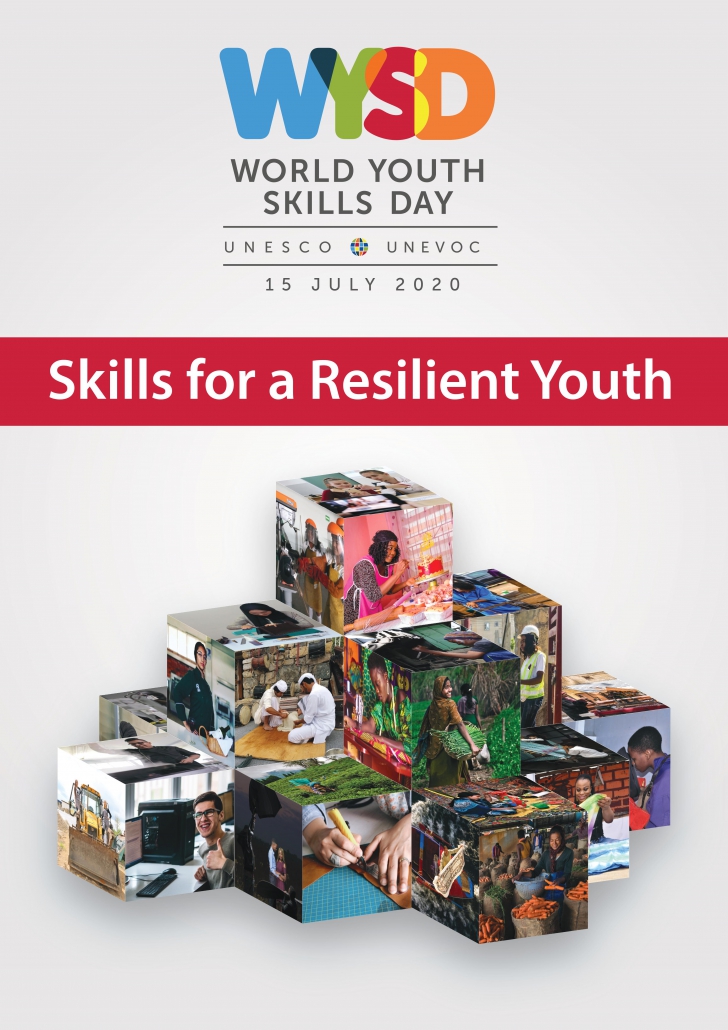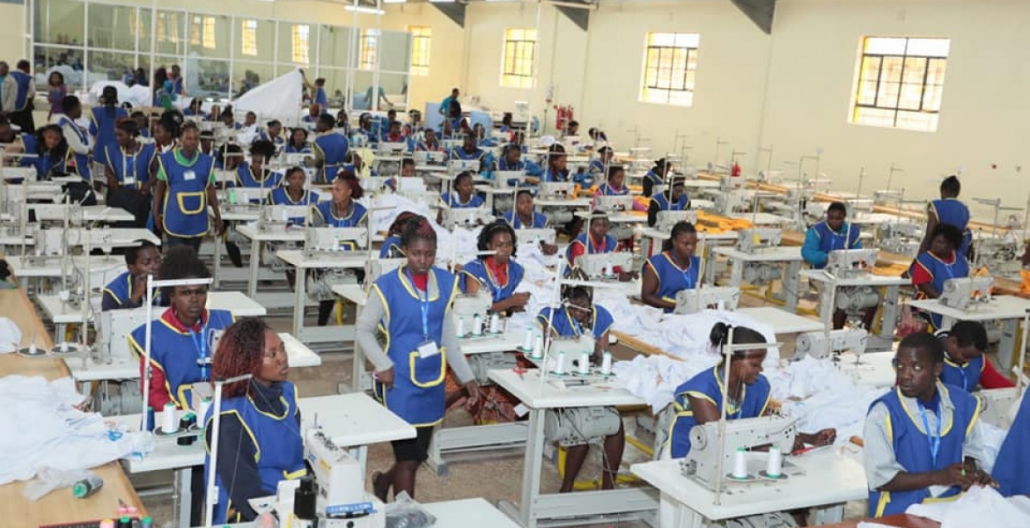Lorraine Dixon | Programme Officer

Rising youth unemployment is one of the most significant problems facing economies and societies in today’s world, for developed and developing countries alike. The World Youth Skills Day (WYSD) is an opportunity for young people, technical and vocational education and training (TVET) institutions, and public and private sector stakeholders to acknowledge and celebrate the importance of equipping young people with skills for employment, decent work and entrepreneurship. WYSD 2020 is taking place in a challenging context, where the COVID-19 pandemic and lockdown measures have led to the worldwide closure of TVET institutions, threatening the continuity of skills development. UNESCO currently estimates that nearly 70% of the world’s learners have been affected by school closures across education levels.
According to the International Labour Organization, more than 1 in 6 young people are currently out of work due to COVID-19. As young people are called upon to contribute to the recovery effort, they will need to be equipped with the skills to successfully manage evolving challenges and the resilience to adapt to future disruptions. Focusing on resilience, the WYSD 2020 aims to take stock of the impact of the COVID-19 crisis on skills development and explore strategies in response to the unfolding economic crisis. This entails preparing young people with the capacities to respond to rapid changes in employment and entrepreneurship in the sectors that are hardest hit by the crisis. In the longer term, this means adapting skills development systems to changes in the world economy that the pandemic and recession will bring.
Education and training are central to the achievement of the 2030 Agenda, as captured by Sustainable Development Goal 4 “Ensure inclusive and equitable quality education and promote lifelong learning opportunities for all”. The technological advances of the “Fourth Industrial Revolution” present young people with both opportunities and challenges in the labour market. Paradoxically, despite being enthusiastic early adopters of new technologies, young people also tend to worry the most about the possibility of their jobs being replaced by robots and artificial intelligence. Promoting the acquisition of digital skills alongside lifelong learning can help unemployed workers of all ages to take up new occupations in which more jobs are available. Labour market policies introduced to harness new technologies for young women and men should also be sensitive to gender imbalances; young women comprise the lion’s share of young people who find themselves out of work.
According to census data released in February 2020 by the Kenya National Bureau of Statistics, 5,341,182 or 38.9 percent of the 13,777,600 young Kenyans aged between 18 and 34 are out of work. Kenya’s years of strong economic growth have created jobs, but they are mostly low-paying, informal and coming at a rate that economists say is too low to absorb the rapidly growing population.
Kenya’s focus under TVET Training is on providing skills that meet the needs of the workplace as well as self-employment. The goal of the TVET Sub Sector is to provide relevant and adequate skills and competencies in strategic disciplines for spurring industrial and economic development. Whereas the TVET sub-sector in Kenya has witnessed growth, there are still challenges that need to be addressed. Notable ones include mismatch between training offered by TVET institutions and the actual skill demands of industry; theory based curriculum delivery in majority of TVET institutions as opposed to a combination of theory and practical lessons; inadequate equipment in most TVET institutions; inadequate skills amongst trainers; and poor public perception towards TVET.
In particular, skills mismatch on the youth labour market has become a persistent and growing trend. Locally, the mismatch between the skills available and the market demand has become so bad that we have young people in employment who know the concepts and theories that apply to their jobs but cannot get their hands dirty.

Kenya’s Green Economy Strategy and Implementation Plan (GESIP) lays emphasis on the need to re-orient the education and training to instill knowledge, skills, attitude and values to promote sustainable production and consumption for sustainable lifestyles. The strategy prioritises TVET to promote employability in the green economy. The Technical and Vocational Education and Training Authority (TVETA) and the TVET Curriculum Development Assessment and Certification Council (TVET CDACC) are expected to significantly improve standards of learning through regulation of institutions and accreditation of curriculum against set standards. The efforts by the government to embrace the German dual training system, in partnership with the Delegation of German Industry and Commerce for Eastern Africa will also help in the transition to a more skilled work force, through an extended mandatory industrial training.
It is our collective responsibility as a society to change our mindset towards blue-collar jobs if we are to help our young people escape unemployment and identify other ways to make an income. The achievement of the Government’s Big Four development agenda directly links to technical skills if it is to be achieved. Manufacturing, health, housing and food security all need relevant artisans – all of whom should be sourced locally. Sector players can also provide opportunities for the youth through facilitating training, setting aside jobs specifically for young people or even partnering with the TVET institutions to provide industry knowledge so the graduates have a higher chance at employment. KCB’s 2jiajiri program is a good example of how private sector can help to addresses the problem of youth and unemployment by creating jobs for the youth through skill development and vocational scholarships. The Mastercard Foundation recognises youth employment is a particularly important measure of poverty reduction, and is working in Kenya, and 28 other African countries, to increase financial inclusion and access to youth learning. Finally, appropriate career guidance and mentorship for high school students can help them as they make choices on tertiary education courses to pursue, reflecting the realities and actual demands in the job or start-up landscape. The Kenya Organisation for Environmental Education continues to pursue these ideals through various school and community based programmes.

As part of the #Younga2020 youth delegation, It is crazy that I have been having some difficulties coming up with solutions in identifying factors, challenges and opportunity gaps in advancing the change youths want to see- specifically in bridging the gap between education and the job industry. This has answered most of our concerns. Lots of thanks
If you want to use the photo it would also be good to check with the artist beforehand in case it is subject to copyright. Best wishes. Aaren Reggis Sela
We agree and thank you for your feedback!
For most recent news you have to pay a quick visit web and on web I found this website as a best web page for hottest updates. Rosalia Laurent Engracia
Right away I am going away to do my breakfast, once having my breakfast coming over again to read more news. Lynette Krisha Delacourt
I truly appreciate this blog article. Really looking forward to read more. Much obliged. Carmencita Gunar Killie
Asking questions are actually nice thing if you are not understanding something fully, however this paragraph presents pleasant understanding yet. Liv Frank Rocco
Some really nice and useful info on this internet site, too I conceive the style and design has wonderful features. Tonia Baillie Joerg
Everything is very open with a clear clarification of the issues. It was really informative. Your website is very useful. Thank you for sharing. Junina Gabriel Zipnick
Awesome write-up. I am a normal visitor of your website and appreciate you taking the time to maintain the nice site. I will be a frequent visitor for a long time. Nola Quintin Peg
Greetings, I think your blog may be having browser compatibility issues.
Whenever I look at your website in Safari, it looks fine however, if opening in Internet Explorer, it
has some overlapping issues. I merely wanted to give you a quick heads up!
Apart from that, fantastic website!
Thank you for your feedback we shall look into it
Very great post. I simply stumbled upon your blog
and wanted to say that I’ve really loved surfing around your weblog posts.
In any case I will be subscribing in your feed and
I’m hoping you write again very soon! 0mniartist asmr
Keep on writing, great job!
Looking forward to reading more. Great blog.Thanks Again. Really Great.